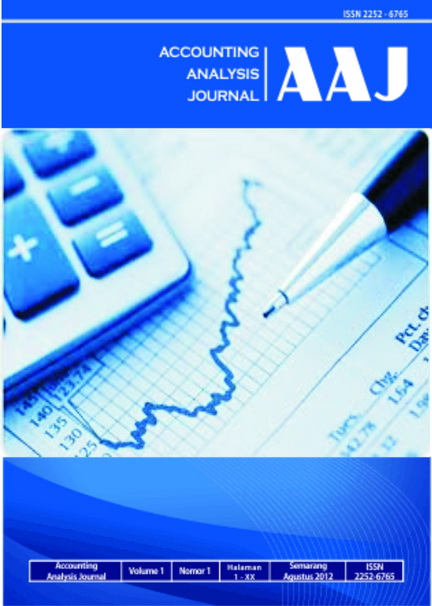DETERMINAN PERILAKU INVESTOR INDIVIDU DALAM PENGAMBILAN KEPUTUSAN INVESTASI SAHAM
##plugins.themes.academic_pro.article.main##
Abstract
Tujuan dari penelitian ini adalah mengkaji dan memperoleh bukti empiris perilaku investor individu dalam pengambilan keputusan investasi saham. Jenis penelitian ini adalah penelitian kuantitatif dengan teknik purposive sampling. Populasi yang digunakan dalam penelitian ini adalah investor individu yang masih berstatus sebagai mahasiswa di wilayah Semarang dan yang aktif bertransaksi di Bursa Efek Indonesia. Sampel yang digunakan adalah mahasiswa anggota Kelompok Studi Pasar Modal (KSPM) pada beberapa perguruan tinggi di Semarang, yaitu UNNES, UNDIP, UDINUS, UIN Walisongo, dan UNIKA. Hasil penelitian menunjukkan bahwa kualitas informasi akuntansi dan persepsi kontrol perilaku secara langsung berpengaruh terhadap intensi investor dalam pemilihan saham, dan kualitas informasi akuntansi secara langsung berpengaruh terhadap persepsi risiko tidak sistematis. Non signifikansi terjadi pada pengaruh antara norma subjektif terhadap intensi investor dalam pemilihan saham dan persepsi risiko tidak sistematis terhadap intensi investor dalam pemilihan saham. Direkomendasikan agar penelitian selanjutnya dilakukan ketika pasar modal sedang dalam kondisi bearish, sehingga dapat memberikan penjelasan yang berbeda mengenai tanggapan investor terhadap risiko investasi saham.
Â
The aim of this study is to examine and obtain empirical evidence of the behavior of individual investors in the stock investment decisions. This research is a quantitative research with sampling purposive technique. The population of this study is individual investors that still exist as students in Semarang and they actively invest in the Indonesia Stock Exchange. The samples of this study are student members of the Capital Markets Study Group (KSPM) at the universities in Semarang, namely UNNES, UNDIP, UDINUS, UIN Walisongo, and UNIKA. The results showed that the quality of accounting information and perceived behavioral control significantly influences the intention of selecting stock, subjective norms and the quality of accounting information significantly influences the perceived behavioral control, and the quality of accounting information significantly influences the perception of unsystematic risk. Whereas subjective norm and the perception of unsystematic risk does not affect the intention of selecting stock. It recommended to do the research during bearish market, so it can probably give different result about investor’s risk perception.
##plugins.themes.academic_pro.article.details##
References
_______. 2006. The theory of planned behavior. Tersedia di : http://people.umass.edu/aizen/tpb.html. Diambil pada tanggal 5 Februari 2015.
Adhikara Arrozi, dan Septiyanto Dhihin. 2011. Perilaku Investor Individu Dalam Pengambilan Keputusan Investasi Sekuritas Di Bursa Efek Indonesia. Simposim Riset Ekonomi V, ISEI, Oktober, Surabaya.
Adhikara Arrozi, dan Maslichah, Nur Diana. 2013. Karakteristik Kualitatif Informasi Dalam Revisian Keyakinan Pengguna Untuk Penilaian Prospek Sekuritas Di Bursa Efek Indonesia. Hasil Penelitian Fundamental Dengan Dana DIKTI Tahun Anggaran 2013. Universitas Esa Unggul Jakarta.
_______. 2014. Manfaat Informasi Akuntansi Dalam Intensi Pemilihan Saham Di Bursa Efek Indonesia. SNA 17 Mataram, Lombok 24-27 September 2014.
Broome Tracey, Alleyne Philmore. 2010. An Exploratory Study of Factors Influencing Investment Decisions of Potencial Investors. Department of Management Studies, University of the West Indies, Cave Hill Campus, Barbados.
Christanti, D. 2008. Sikap ataukah Significant Others Yang Dapat Mempengaruhi Intensi Membuang Sampah Sesuai Jenisnya. Jurnal Ilmiah Psikologi Manasa, 2, 129-145.
Harahap, Sofyan S. 2013. Teori Akuntansi (edisi revisi 2011). Jakarta: Rajawali. Halaman 123.
Koonce, Lisa, and Mercer, Molly. 2004. Using Psychology Theories in Archival Financial Accounting Research. Journal of Accounting Literature, pp 175-190.
Mas’ud, Muchlis H. 2012. Pengaruh Sikap, Norma-Norma Subjektif dan Kontrol Perilaku yang Dipersepsikan Nasabah Bank Terhadap Keinginan Untuk Menggunakan Automatic Teller Machine (ATM) Bank BCA di Kota Malang. Jurnal Manajemen dan Akuntansi, Volume 1, Nomor 3, Desember 2012.
Prabowo, Tommy. 2000. Dissemination of Information di Pasar Modal. Media Akuntansi, No. 10, Thn. VII, Juni, Jakarta.
Suryani Tatik, Listyarti Indra. 2014. Determinant Factor of Investors Behavior in Investment Decision in Indonesia Capital Markets. Journal of Economics, Business and Accountancy Ventura Vol. 17, No. 1 April 2014, p. 45-54
Suwarjono. 2008. Teori Akuntansi, Perekayasaan Pelaporan Keuangan. Yogyakarta: BPFE Yogyakarta.
Tan, Margaret dan Thompson S. H. Teo. 2000. “Factors Influencing the Adoption of Internet Bankingâ€. Journal of the Association for Information Systems. Volume1, July 2000. http://jais.aisnet.org.
Wahyono, Budi. 2014. Teori Perilaku Yang Direncanakan (Theory of Planned Behavior). Tersedia di: http://www.pendidikanekonomi.com /2014/08/teori-perilaku-yang-direncanakan-theory.html. Diambil pada tanggal 12 Februari 2015.
Wong, William. 2012. Planned Behavior Theory. Tersedia di https://wilyleo.wordpress.com/2012/03/05/planned-behavior-theoryplanned-behavior-theory/. Diambil pada tanggal 5 Februari 2015.
Zhou Jian, Khoa Cuong Phan. 2014. Factors Influencing Individual Investor Behavior : An Empirical Study of the Vietnamese Stock Market. American Journal of Business and Management Vol. 3, No. 2, 2014, 77-94.
